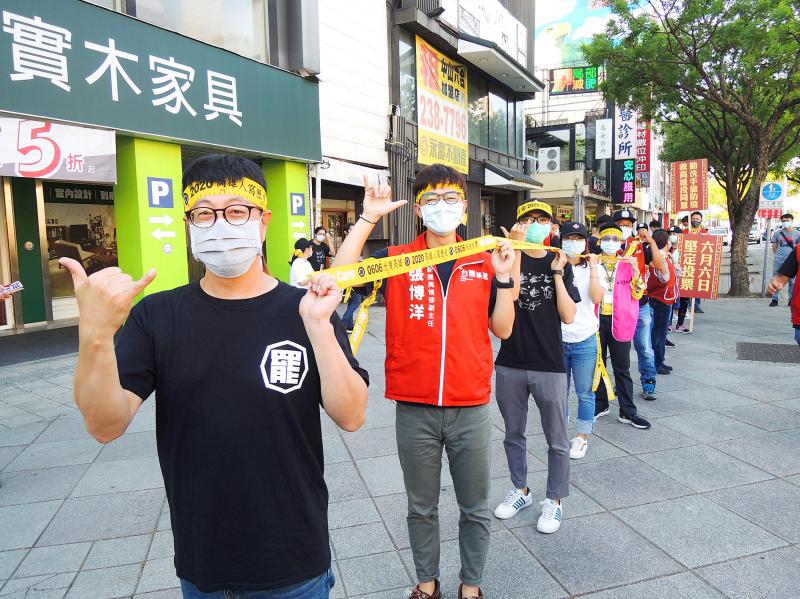The Central Election Commission (CEC) yesterday announced that nearly 90 percent of the space needed to hold a vote on whether to recall Kaohsiung Mayor Han Kuo-yu (韓國瑜) has been secured, after city agencies limited voting space.
The Kaohsiung Education Bureau and Kaohsiung Civil Affairs Bureau previously said that they would limit space in schools and temples to be used for the vote, citing COVID-19 prevention measures.
The vote is to take place on June 6.

Photo: Wang Jung-hsiang, Taipei Times
The CEC yesterday said that of the 1,823 venues it hoped to use, 1,622 have so far been secured — a total of 88.97 percent of the space needed, adding that it still needs to work out arrangements for voting stations in the city’s Sanmin (三民), Fongshan (鳳山) and Lingya (苓雅) districts.
As of yesterday, the CEC had secured 51.85 percent of the 189 venues it needs in Sanmin, 67.54 percent of the 228 venues it needs in Fongshan and 68.97 percent of the 116 venues it needs in Lingya, it said.
The city’s departments had been gradually reducing the number of venues they had agreed to provide, the CEC said, adding that they had initially agreed to provide 1,513 venues, which was reduced to 1,367 in a second report to the commission, and to 1,182 in a third report.
However, after negotiations the CEC was able to secure 1,622 of the venues needed, it said.
Meanwhile, Democratic Progressive Party (DPP) Kaohsiung City Councilor Kang Yu-cheng (康裕成) yesterday said a poll showed that Sanmin residents formed the largest group in support of recalling Han, accounting for 14 percent of the total figure citywide.
This meant the district also had the greatest need in terms of polling stations, Kang said, adding that it is still lacking 48 percent of the venues needed.
Kang and fellow DPP Kaohsiung City Councilor Ho Chuan-feng (何權峰) appealed to city government agencies to safeguard city residents’ right to vote, and implored “those with ill intent” to stay out of the voting process.
Of the venues needed in the three districts still trying to secure space, 70 percent should be schools and 14 percent should be public recreation centers, the two councilors said.
“There are still 91 places where we don’t have venues. Are you saying these places don’t even have sports fields we can use? Are there borough wardens who want to lend space, but are getting obstructed by district offices?” Ho asked.

AGING: As of last month, people aged 65 or older accounted for 20.06 percent of the total population and the number of couples who got married fell by 18,685 from 2024 Taiwan has surpassed South Korea as the country least willing to have children, with an annual crude birthrate of 4.62 per 1,000 people, Ministry of the Interior data showed yesterday. The nation was previously ranked the second-lowest country in terms of total fertility rate, or the average number of children a woman has in her lifetime. However, South Korea’s fertility rate began to recover from 2023, with total fertility rate rising from 0.72 and estimated to reach 0.82 to 0.85 by last year, and the crude birthrate projected at 6.7 per 1,000 people. Japan’s crude birthrate was projected to fall below six,

US President Donald Trump in an interview with the New York Times published on Thursday said that “it’s up to” Chinese President Xi Jinping (習近平) what China does on Taiwan, but that he would be “very unhappy” with a change in the “status quo.” “He [Xi] considers it to be a part of China, and that’s up to him what he’s going to be doing, but I’ve expressed to him that I would be very unhappy if he did that, and I don’t think he’ll do that. I hope he doesn’t do that,” Trump said. Trump made the comments in the context

SELF-DEFENSE: Tokyo has accelerated its spending goal and its defense minister said the nation needs to discuss whether it should develop nuclear-powered submarines China is ramping up objections to what it sees as Japan’s desire to acquire nuclear weapons, despite Tokyo’s longstanding renunciation of such arms, deepening another fissure in the two neighbors’ increasingly tense ties. In what appears to be a concerted effort, China’s foreign and defense ministries issued statements on Thursday condemning alleged remilitarism efforts by Tokyo. The remarks came as two of the country’s top think tanks jointly issued a 29-page report framing actions by “right-wing forces” in Japan as posing a “serious threat” to world peace. While that report did not define “right-wing forces,” the Chinese Ministry of Foreign Affairs was

PREPAREDNESS: Given the difficulty of importing ammunition during wartime, the Ministry of National Defense said it would prioritize ‘coproduction’ partnerships A newly formed unit of the Marine Corps tasked with land-based security operations has recently replaced its aging, domestically produced rifles with more advanced, US-made M4A1 rifles, a source said yesterday. The unnamed source familiar with the matter said the First Security Battalion of the Marine Corps’ Air Defense and Base Guard Group has replaced its older T65K2 rifles, which have been in service since the late 1980s, with the newly received M4A1s. The source did not say exactly when the upgrade took place or how many M4A1s were issued to the battalion. The confirmation came after Chinese-language media reported